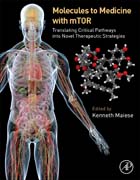
Molecules to Medicine with mTOR: Translating Critical Pathways into Novel Therapeutic Strategies
Maiese, Kenneth
Molecules to Medicine with mTOR: Translating Critical Pathways into Novel Therapeutic Strategies is a one-stop reference that thoroughly covers the mechanistic target of rapamycin (mTOR). mTOR, also known as the mammalian target of rapamycin, is a 289-kDa serine/threonine protein kinase that is ubiquitous throughout the body and has a critical role in gene transcription and protein formation, stem cell development, cell survival and senescence, aging, immunity, tissue regeneration and repair, metabolism, tumorigenesis, oxidative stress, and pathways of programmed cell death that include apoptosis and autophagy. Incorporating a translational medicine approach, this important reference highlights the basic cellular biology of mTOR pathways, presents the role of mTOR during normal physiologic function and disease, and illustrates how the mechanisms of mTOR can be targeted for current and future therapeutic treatment strategies. Coverage of mTOR signaling includes the entire life cycle of cells that impacts multiple systems of the body including those of nervous, cardiovascular, immune, musculoskeletal, endocrine, reproductive, renal, and respiratory origin. Covers the role of mTOR by internationally recognized expert contributors in the field.Provides a clear picture of the complexity of mTOR signaling as well as of the different approaches that could target this pathway at various levels.Includes analysis of the role of mTOR and in both health and disease.Serves as an important resource for a broad audience of healthcare providers, scientists, drug developers, and students in both clinical and research settings. INDICE: (1) Novel Stem Cell Strategies with mTOR Kenneth Maiese (2) mTOR: The master regulator of conceptus development in response to uterine histotroph during pregnancy in ungulates Xiaoqiu Wang, Guoyao Wu and Fuller W. Bazer (3) mTORC1 in the control of myogenesis and adult skeletal muscle mass Marita A. Wallace, David C. Hughes, and Keith Baar (4) mTOR: A Critical Mediator of Articular Cartilage Homeostasis Akihiro Nakamura and Mohit Kapoor (5) The Role of mTOR, Autophagy, Apoptosis and Oxidative Stress during Toxic Metal Injury Sarmishtha Chatterjee, Chayan Munshi, and Shelley Bhattacharya Section II. mTOR in Genetic Disorders and Neurodegenerative Disease (6) The mTOR signaling pathway in neurodegenerative diseases Arnaud FRANCOIS, Julie VERITE, Agnès RIOUX BILAN, Thierry JANET, Frédéric CALON, Bernard FAUCONNEAU, Marc PACCALIN, and Guylène PAGE (7) mTOR: Exploring a new potential therapeutic target for stroke Mar Castellanos, Carme Gubern, and Elisabet Kadar (8) mTOR signalling in epilepsy and epileptogenesis: preclinical and clinical studies Antonio Leo, Andrew Constanti, Antonietta Coppola, Rita Citraro, Giovambattista De Sarro, and Emilio Russo (9) mTOR, Autophagy, Aminoacidopathies and Human Genetic Disorders Garrett R. Ainslie, K. Michael Gibson, and Kara R. Vogel Section III. mTOR in Memory, Behavior, and Aging (10) mTOR involvement in the mechanisms of memory: an overview of animal studies Maria Grazia Giovannini and Daniele Lana (11) Mammalian Target of Rapamycin (mTOR), Aging, Neuroscience And Their Association With Aging-Related Diseases Ergul Dilan Celebi Birand, Elif Tugce Karoglu, Fusun Doldur Balli, and Michelle Adams (12) The role of mTOR in mood disorders pathophysiology and treatment Gislaine Z. Réus, Meagan R. Pitcher, Camila O. Arent, and João Quevedo (13) mTOR and Drugs of Abuse Jacob T. Beckley and Dorit Ron Section IV. mTOR in Cardiovascular Development and Disease (14) mTOR as a modulator of metabolite sensing relevant to angiogenesis Soumya S.J., Athira A.P., Binu S. and Sudhakaran P. R (15) Role of mTOR Signaling in Cardioprotection Anindita Das and Rakesh C Kukreja (16) Role of Mammalian Target of Rapamycin (mTOR) in Cardiac Homeostasis in Metabolic Disorders Xiangwei Liu and Jun Ren Section V. mTOR in the Immune System and Autoimmune Disorders (17) Roles of Mechanistic Target of Rapamycin in the Adaptive and Innate Immune Systems Hiroshi Kato and Andras Perl (18) The Role of mTOR Inhibitors in Solid Organ Transplantation Greg J. McKenna and Goran B.G Klintmalm (19) mTOR and neuroinflammation Filipe Palavra, António Francisco Ambrósio, and Flávio Reis (20) Novel Molecular targets in Multiple Sclerosis: the emerging role of mTOR in the regulation of glial biology Cinzia Dello Russo, Pierluigi Navarra, and Lucia Lisi Section VI. mTOR in the Endocrine System and Disorders of Metabolism (21) mTOR in metabolic and endocrine disorders Marta M. Swierczynska and Michael N. Hall (22) Chronic mTOR inhibition by rapamycin and diabetes: What is the role of mitochondria? Liang-Jun Yan and Zhiyou Cai (23) mTOR in diabetic nephropathy and retinopathy Rosa Fernandes and Flávio Reis Section VII. mTOR and Cancer (24) Lymphangioleiomyomatosis (LAM): Molecular Insights into mTOR Regulation Lead to Targeted Therapies Wendy K. Steagall, Connie G. Glasgow, Gustavo Pacheco-Rodriguez, and Joel Moss (25) mTOR PATHWAY IN RENAL CELL CARCINOMA Matteo Santoni and Francesco Massari (26) Metabolic Shunt Pathways, Carcinoma, and mTOR Norisuke Shibuya, Ken-ichi Inoue, and Keiichi Kubota
- ISBN: 978-0-12-802733-2
- Editorial: Academic Press
- Encuadernacion: Rústica
- Páginas: 512
- Fecha Publicación: 13/05/2016
- Nº Volúmenes: 1
- Idioma: Inglés
